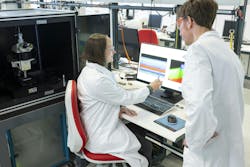BASF partners with Endress+Hauser and others to improve mechanical recycling of plastics

BASF, Endress+Hauser, TechnoCompound, and the German Universities of Bayreuth and Jena have partnered to study ways to improve the mechanical recycling of plastics. The project, called SpecRek, is being partially funded by the German Federal Ministry of Education and Research (BMBF) with the goal of reliably and precisely identifying the composition of plastic waste during the recycling process to improve the quality of recycled plastics.
The researchers will use state-of-the-art spectroscopic methods to collect data about the chemical structure of the recycled plastics and artificial intelligence (AI) to recognize patterns in the measurement data and recommend additional components to be added or how the recycling process should be adapted to improve the quality of the recycled plastic output.
“We do not currently have the necessary analysis tools to determine during processing exactly which components are contained in the mechanically recycled plastics,” explained Dr. Bernhard von Vacano, head of the Plastics Circularity research program at BASF. “This will enable us to use more mechanically recycled plastics to produce high-quality products and to make recycling processes more efficient and sustainable.”
The quality of mechanically recycled plastic depends on the input material and the degree of sorting, and the goal of this research is to improve that sorting and allow more recycled plastic to be transformed back into high-value plastic products.
“With the increasing demand for high-quality recycled materials, and given the current legal framework, it will be crucial to perfectly understand the material properties and composition of mechanically recycled plastic waste and to optimize the process. In this way, we will strengthen the circular economy,” von Vacano said.
The project budget is €2.2 million, with two-thirds coming from BMBF’s quantum systems research program and one-third from the project partners.